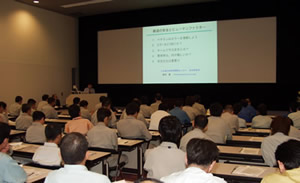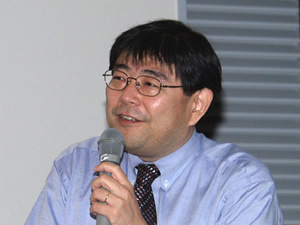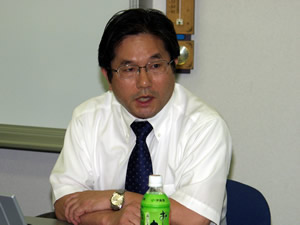|
|
 |
| The 85th Safety Caravan was held at the Tsuruga Nuclear Power Station of Japan Atomic Power Company (JAPC) in Tsuruga-shi, Fukui Prefecture on July 20, 2006. |
|
| Safety Presentation
|

|
|
During the safety presentation
|
Fifty-five employees of Japan Atomic Power Company and affiliated companies attended the Safety Presentation.
The presentation began with a salutation from Mr. Shinji Kato, director and plant manager of the Tsuruga Power Station of Japan Atomic Power Company. "As persons working at nuclear power stations, I believe we all perform our jobs with confidence in safety at all times, and especially with employees of JAPC and employees of affiliated companies working together in the operation of the plant, it is important to communicate through a variety of actions, share information, and endeavor on the same level of consciousness in various activities. We have experienced a number of troubles, but, I believe that one of the things that is included in safety culture is how to detect an abnormal condition of equipment at an early stage in the midst of the great deal of machinery and equipment, and the implementation of appropriate provisional measures. At present, Tsuruga Unit No. 2 is undergoing adjustment operation, but another aspect of safety culture is conducting thorough examination during outages so as to uncover any abnormality, dealing with the matter in an appropriate manner, and thusly continue the safe and stable operation for the next 13 months until it is time for the next outage. Through today's presentation, I hope you will consider what practices we should adopt and what has been lacking in our industry and to make use of these activities."
After this salutation, Japan Nuclear Technology Institute (JANTI) introduced the current state of activities, followed by Mr. Ken Kusugami, Deputy Manager of Safety Research Laboratory at the Research and Development Center of JR East Group, East Japan Railway Company who delivered a presentation entitled "Railway Safety and the Human Factor."
|
"Japan Nuclear Technology Institute (JANTI) carries out peer reviews, safety caravans and safety climate surveys on our company's behalf. In the previous peer review conducted in January 2004, there were three items earmarked for improvement. One of those was a recommendation to actively engage in information disclosure, which has been furthered by electric power companies. And then, a proposal was made for creating such a framework. Having received such a proposal, our company also felt the need for information disclosure, and together with three fuel processing manufacturers, efforts began in the disclosure of information, and the operating status, including information about troubles, was published on our website. It just so happened at the time, that when we received an inquiry from the Nuclear and Industrial Safety Agency (NISA) as to what we were doing in the way of information disclosure, we were just in the process of making preparations for information disclosure as a result of having received the suggestion for improvement, and so we were able to provide an excellent reply. We believe that it is because on-site free exchanges of opinions are made possible at peer reviews, and because the peer reviews are not of an auditing nature, that is why we were able to respond to such a proposal.
"Through the new opinions and the stimulus received from the Safety Presentation and the Information Exchange Session at today's Safety Caravan, we hope to make efforts to raise the level of safety climate higher and higher. We look forward to your guidance." With this, Mr. Matsumoto concluded his greetings.
After the salutation, JANTI introduced its action policies and the state of activities of NSnet Division. Following this, Mr. Seiichi Yoshimura , Deputy Manager of the Human Factors Research Center , Socio-economic Research Center of the Central Research Institute of Electric Power Industry (CRIEPI) delivered a speech entitled "Safety measures and understanding of the human factor." |
Lecture highlights |

|
|
Mr.Ken Kusugami
|
At the presentation, Mr. Kusugami brought up some very valuable points, including the following.
From the perspective of preventing accidents caused by human error, we need to understand these points: 1) understand errors committed by veterans, 2) how to prevent errors, 3) what is team observance of safety rules, 4) what are the difficulties with abnormalities, and 5) the importance of safety culture.
<Understanding errors committed by veterans>
As new employees grow accustomed to their duties, they become proficient at their jobs. This proficiency is of course a good point, but on the other hand, this brings about a transition into the state of one performing one's duties unconsciously (unconscious actions), and this accounts for a large portion of errors committed by veterans. We need to understand errors by veterans and think about ways to prevent such errors.
<How can we prevent errors>
When people are working, it is not possible to be at one's maximum state of alertness at all times. If the state of alertness can go up, it goes without saying that it can also go down. We need to think about error prevention measures based on this aspect of human nature. For this reason, as we perform our duties, we need to be conscious of the environments and circumstances as well as one's own state of mind when errors are prone to occur and be aware when caution is necessary.
<What is team observance of safety rules>
In times of abnormality, teamwork is very important. That is why we implement the "JR style CRM" at the command center to continuously improve team performance in times of abnormality so as to extract and share lessons to be learned from the response to the outbreak of abnormalities. By all members of the team speaking frankly, problematic points that had gone mutually unnoticed are quickly brought out into the open, making it possible to implement improvements quickly and to accumulate and share know-how and lessons learned in a timely manner. I believe this technique is an extremely effective method for improving the degree of workplace safety.
<The difficulties during times of abnormality>
Railway workers have an consciousness of wanting to operate their trains in accordance with the timetables. This in itself is not a bad thing. But under conditions where safety is threatened, it is important to be able to switch from the values under normality to taking actions that are founded upon safety, and for that reason simulation drills are carried out.
<The importance of safety culture>
To sum up the meaning of safety culture, I believe that it all boils down to how serious the employees believe in "safety first," but the depth of recognition varies among individuals. If a person's understanding is shallow, the response is likely to be, "Safety is important? Well, of course, that goes without saying." In order to deepen that understanding, it is really important to understand the disastrous consequences of accidents. It is only then, after being able to perceive the situation from the perspective of the victims or their families that one can finally begin to understand the true meaning of and importance of safety. |
In the questionnaire after the presentation, the following opinions were expressed.
•All in all, the inclusion of general insights in addition to JR's own endeavors make the content of the lecture easy to understand. Especially in the explanation about risk homeostasis, there are parts that made me personally aware of, and I want to make an effort personally and together with those around me in the atmosphere of advancement of safety culture.
•In order to do away with unsafe actions, it is important to be habitually aware of safety, and I want to endeavor toward safety first while setting my sights upon the actions that I should take.
• In the safe and stable operation of a nuclear power plant, as is the case also in the railroad sector, human error and how to respond in a time of abnormality and the like are important, and today's safety presentation has been very useful. With today's presentation as a reference, I want to take a fresh look at my own routine actions so as to prevent human error on the job, and make use of this in doing my job. It has renewed my recognition of the importance of safety.
•As far as human error is concerned, the content was extremely systematic, and it was well worth the time. Especially, errors committed by veterans, team observance of safety rules, and the time axis of taking action left an impression on me, and it made me feel that I would like to utilize these from now on.
|
Safety information exchange session |

|
|
Mr.Kenji Yoshida
|
(1) Introduction of endeavors and exchange of opinions
The safety information exchange session was honored by the presence of Mr. Kenji Yoshida, Compliance Group Leader of the GNF-J, who presented a detailed introduction of the permeation and establishment of safety awareness rooted in integrity.
Also, Mr. Keizaburo Yoshino, General Manager of the Operation Management Group, Tsuruga Nuclear Power Station, Japan Atomic Power Company introduced measures for the prevention of human errors at Tsuruga Nuclear Power Station. After the presentations, information and opinions were exchanged regarding the above-mentioned activities and endeavors.
(2) Other
The NS Net Division explained about the Division's information and database about nuclear power safety culture fostering.
|
|
|







